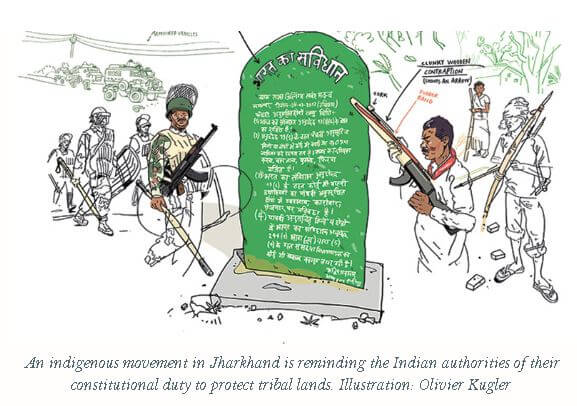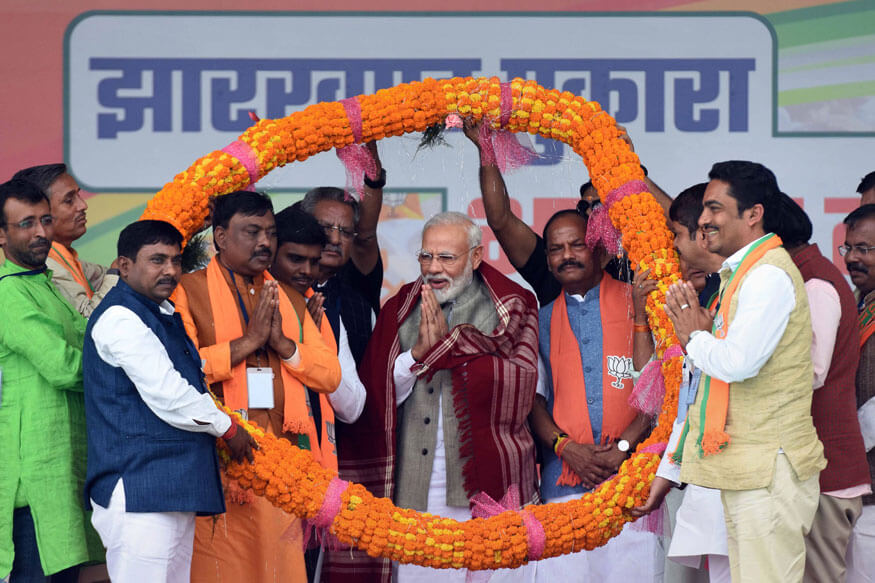Jharkhand is gearing up to elect its next Chief Minister (CM)–with voting having begun on November 30th–against a backdrop of 'detribalization' in the politically volatile state.
The BJP’s Raghubar Das became the state's first non-tribal CM, and the first CM to complete his full tenure. However, there exists a tremendous amount of anti-incumbency sentiment against him.
In the 2014 assembly election, in an alliance with the All Jharkhand Students’ Union (AJSU), the BJP secured a simple majority, ahead of Congress and the Jharkhand Mukti Morcha (JMM). Through its alliance with the ASJU, the BJP was able to add to its existing support from upper castes and Other Backward Castes (OBCs) by gaining several votes from the Scheduled Tribes (STs), who form 27% of the population and constitute a majority in 25 constituencies, and had historically voted for smaller, local parties.
In the current election, Congress, JMM, and the Rashtriya Janata Dal (RJD) have formed a united front. In addition, the AJSU has renounced its alliance with the BJP, hindering the BJP's ability to capture tribal votes in areas such Chhota Nagpur and in the OBC Kurmi community, where the AJSU commands significant support.
Following its sub-par performance in Haryana and its bitter separation with Shiv Sena in Maharashtra, the BJP's focus on nationalistic and religious issues has weakened its position relative to opposition parties, which have begun to focus on local issues and state performance in the last five years.
Jharkhand shares certain commonalities with Haryana and Maharashtra, where there are also significant tribal communities and sections of the populations which are dependent on forests. The Forest Rights Act (FRA) grants legal recognition to traditional forest-dwelling communities by providing them land and use rights, along with the right to protect, conserve and manage the forests. However, the inefficient implementation of the act has contributed to the BJP losing state elections in Madhya Pradesh, Chattisgarh, and Rajasthan, and losing in 22% of FRA-sensitive constituencies in the recent Maharashtra election. Similarly, Jharkand has a high number of tribal communities and forest-dwellers; the FRA is critical for almost 52% of total voters in the state, but Jharkhand has an extremely poor rate of settled claims.
In addition to the poor implementation of the FRA, there has been tribal resistance against the BJP's amendments to the Chhota Nagpur Tenancy Act, 1908 and the Santhal Pargana Tenancy Act, 1949, which protect tribal land rights. Chhota Nagpur and Santhal Pargana have significant tribal populations, and these Acts protect their rights by restricting the transfer and sale of tribal lands to non-tribals.
However, despite the withdrawal of the proposed amendments to the CNT and SPT Acts, the Raghubar Das government passed the Land Acquisition (Jharkhand Amendment) Act, 2017 in the assembly. The Act amends the 2013 Land Acquisition Act by exempting the government from conducting social impact assessments for infrastructure projects and severely diminishes the role of Gram Sabhas in providing consent for the projects. Moreover, the criteria of obtaining 70% consent for public-private projects and 80% for private projects by the affected families has been removed.
The proposed amendments to the CNT and SPT acts, and the implementation of the Land Acquisition Act has established distrust of the BJP among tribal communities. For instance, the majority of Chotanagpur residents are from the Munda and Oraon tribal communities; although 47% of Oraons voted for the BJP in the previous election, the BJP's efforts to diminish tribal land rights is likely to affect their voting behaviour in the ongoing assembly election.
Such transformations of community resources into state-owned commodities have eroded tribal rights and ownership of their natural habitat and disrupted their symbiotic relationship with nature.
These attempts to dilute tribal land and tenancy rights by the state have triggered the Pathalgadi movement, which highlights the government's failure to protect tribal land rights and self-governance enshrined in the Constitution of India and the Panchayat (Extension to the Scheduled Areas) Act, 1996 (PESA), respectively.
While the state has labelled the protestors as 'anti-national’, and the police has charged several with sedition, the anti-BJP sentiment has generated solidarity amongst tribal communities and is sure to significantly impact the 2019 assembly election results.
By focusing on national issues like nationalism and religion, and undermining tribal rights, the BJP has underestimated the importance of local issues like water and land rights in a state like Jharkhand, and appears to have severely compromised its ability to regain control of the state.

